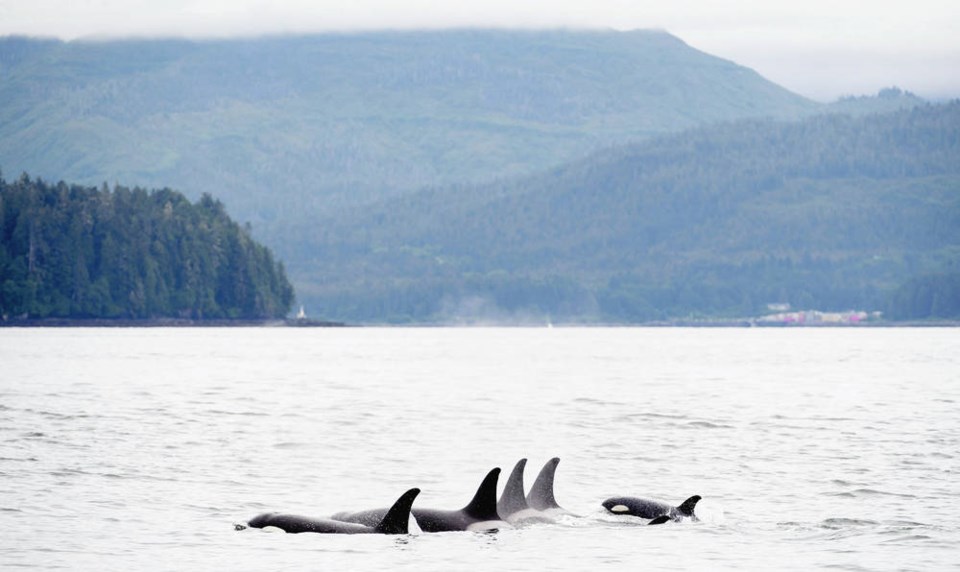Boaters who don’t follow mandatory sanctuary and approach distances could be fined up to $1 million and face up to 18 months in jail.
B.C.’s federal whale protection unit has warned boaters, drone pilots and paddle boarders to keep their distance from southern resident killer whales this summer.
With only 75 animals left off B.C.’s coast, a spokesperson for Fisheries and Oceans Canada said “even small changes to a few individuals can have big impacts.”
In addition to dwindling chinook salmon stocks — the whales’ primary source of food — vessel strikes, entanglements as well as physical and acoustic disturbances, can all badly effect the animals.
“It is everyone’s responsibility to know the rules around marine mammal interactions and illegal activities may be subject to severe penalties,” wrote DFO spokesperson Leri Davies in an email to Glacier Media.
How close can I get?
From a kayak to a yacht, no vessel can come within 400 metres of a killer whale in southern B.C. waters until May 31, 2022.
That includes a swath of ocean wrapping around the southern end of Vancouver Island, from Campbell River in the Straight of Georgia, through the Gulf Islands, into the Straight of Juan de Fuca and up the west coast of Vancouver Island just past Ucluelet.
Outside of the 400-metre approach zone above, all vessels must keep at least 200 metres between them and killer whales.
The 200-metre rule also applies to all other whale species, including dolphins and porpoises, when they are in a resting position or with a calf. Otherwise, boats and other watercraft must stay at least 100 metres away from any whale species that are not killer whales.
The Ministry of Transportation has given special permission to eco-tourism vessels flying a purple “AV” flag to get as close as 200 metres to whales, though they have agreed to avoid southern resident populations.
What about fishing?
In all of B.C.’s coastal waters, DFO asks boaters and fishers to voluntarily stop fishing and slow speed to less than seven knots when spotting killer whales within a kilometre of their location.
When safe, DFO suggests shutting off echo sounders and fish finders.
If you find yourself too close to a killer whale, DFO recommends putting the boat’s engine in neutral and letting the animals pass.
It is illegal to position a boat in a way that would corner an animal along a coastline or between other boats.
There are several seasonal bans on recreational and commercial fishing in key killer whale transit areas.
Can I film a killer whale with a drone?
Yes, but under strict requirements. Drones are required to maintain an elevation of no less than 1,000 feet when within a half nautical-mile radius (about 3,038 feet or 925 metres) of any marine mammal, including whales.
Even at that distance, drone pilots should avoid flight manoeuvres around marine mammals so they don’t stress or alter their behaviour, says DFO.
Stiff penalties for rule- breakers
The DFO’s Pacific whale protection unit runs two high-speed patrol vessels out of Annacis Island in Delta and in Victoria.
Boaters who don’t follow mandatory sanctuary and approach distances could face up to a $1-million fine and up to 18 months in jail.
In the summer of 2019, a Prince Rupert judge ordered a whale guide to pay a $2,000 fine for getting within less than 100 metres of a humpback whale. The fine represented the first conviction under new Marine Mammal Regulations.
Across Canada, it is illegal to feed, touch, swim or in any way interact with a marine mammal. Tagging or marking an animal, moving it or enticing it to move is also illegal.
Anyone who witnesses such infractions or finds a marine mammal in distress or dead, is encouraged to report it to DFO’s Observe, Record and Report line at 1-800-465-4336 or by email at [email protected].



